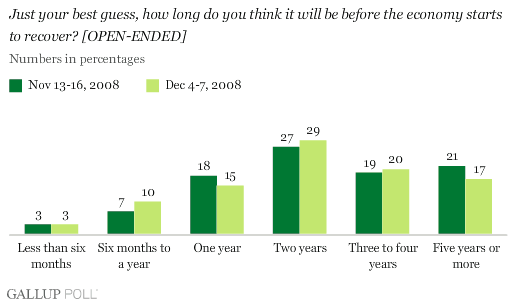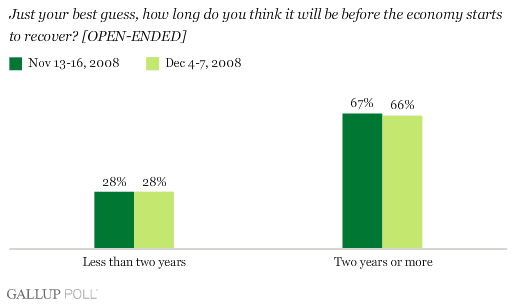WASHINGTON, D.C. -- The news that the United States is already a year into an official recession hasn't dramatically altered Americans' views of how much longer the economic downturn will last. From a broad perspective, the view remains the same -- that the United States is at least two years away from an economic turnaround.

The ÆéûÜǨû§Poll, conducted Dec. 4-7, 2008, followed a week of some of the worst economic news yet, including official reports determining that the United States has been in a recession since December 2007 and that the unemployment rate now stands at 6.7%. Nonetheless, Americans' views of the duration of the downturn fall almost exactly where they did three weeks ago: Two-thirds of Americans continue to say it will be two years or more before the economy starts to recover, while 28% expect it to be less.

Because the United States is already a year into the current recession, if another two years pass before the start of a recovery, it would in fact constitute one of the worst economic downturns in the country's history. The 10 recessions since World War II lasted an average of 10.4 months, from 6 months in 1980 to 16 months in 1981-1982, while the Great Depression lasted 43 months. Economists tend to be more positive than the general public, with many suggesting that the current recession will continue for less than another full year. Nonetheless, the importance of Americans' views cannot be underestimated, as fears of a long recession are likely to affect consumer confidence and spending -- risking the chance of a self-fulfilling prophecy.
Survey Methods
Results are based on telephone interviews with 1,009 national adults, aged 18 and older, conducted Dec. 4-7, 2008. For results based on the total sample of national adults, one can say with 95% confidence that the maximum margin of sampling error is ôÝ3 percentage points.
Interviews are conducted with respondents on land-line telephones (for respondents with a land-line telephone) and cellular phones (for respondents who are cell-phone only).
In addition to sampling error, question wording and practical difficulties in conducting surveys can introduce error or bias into the findings of public opinion polls.
